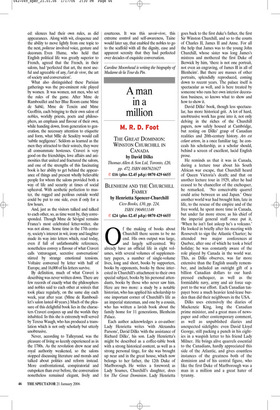A man in a million
M. R. D. Foot
THE GREAT DOMINION: WINSTON CHURCHILL IN CANADA by David Dilks Thomas Allen & Son Ltd, Toronto, £20, pp. 472, ISBN 0887621627 ✆ £16 (plus £2.45 p&p) 0870 429 6655 BLENHEIM AND THE CHURCHILL FAMILY by Henrietta Spencer-Churchill Cico Books, £30, pp. 224, ISBN 1904911149 ✆ £24 (plus £2.45 p&p) 0870 429 6655 Of the making of books about Churchill there seems to be no end. His own output was large, and largely self-centred. We already have an official life in eight volumes, with several volumes of supplementary papers, a number of single-volume lives, long and short, books by supporters, books by opponents, books by those interested in Churchill’s attachment to their own special subject, books by his personal attendants, books by those who never saw him. Here are two more: a study by a notable historian, who has applied his scholarship to one important corner of Churchill’s life as an imperial statesman, and one by a cousin, who has written a lavish book about the family home for 11 generations, Blenheim Palace.
Each author acknowledges a co-author: Lady Henrietta writes ‘with Alexandra Parsons’, David Dilks ‘with the assistance of Richard Dilks’, his son. Lady Henrietta’s might be described as a coffee-table book with a strong historical content, as well as a strong personal tinge, for she was brought up near and in the great house, which now belongs to her father, the 12th Duke of Marlborough. He writes a foreword; as Lady Soames, Churchill’s daughter, does for The Great Dominion. Lady Henrietta goes back to the first duke’s father, the first Sir Winston Churchill, and so to the courts of Charles II, James II and Anne. For all the help that James was to the young John Churchill, whose sister was long James’s mistress and mothered the first Duke of Berwick by him, ‘there is not one portrait, not even an engraving, of James II in all of Blenheim’. But there are masses of other portraits, splendidly reproduced, coming down to recent years. The palace itself is spectacular as well, and is here treated by someone who runs her own interior decoration business, so knows what to show and how to show it.
David Dilks’ book, though less spectacular, has more historical grit. A lot of hard, unobtrusive work has gone into it, not only delving in the riches of the Churchill papers, now safely housed at Cambridge, but resting on Dilks’ grasp of Canadian realities and 20th-century history. Ars est celare artem, in a once familiar tag; he conceals his scholarship, as a scholar should, behind a screen of excellent, lucid English prose.
He reminds us that it was in Canada, during a lecture tour about his South African war escape, that Churchill heard of Queen Victoria’s death; and that on another lecture tour in 1929, after he had ceased to be chancellor of the exchequer, he remarked, ‘No conceivable quarrel could arise between us and Japan.’ Once another world war had brought him, late in life, to the rescue of the empire and of the free world, he spent more time in Canada, but under far more stress; as his chief of the imperial general staff once put it, ‘When he isn’t fast asleep he’s a volcano.’ He looked in briefly after his meeting with Roosevelt to sign the Atlantic Charter; he attended two major conferences at Quebec, after one of which he took a brief holiday; he was constantly aware of the role played by Canada in the world war. This, as Dilks observes, was far more extensive than the English usually remember, and included an outright gift of a billion Canadian dollars to our hardpressed exchequer, as well as the formidable navy, army and air force support to the war effort. Each Canadian taxpayer bore a much heavier lend-lease burden than did their neighbours in the USA.
Dilks uses extensively the diaries of Mackenzie King, long the Canadian prime minister, and a great mass of newspaper and other contemporary comment, as well as unpublished diaries and unexpected sidelights: even David Lloyd George, still packing a punch in his eighties in a waspish letter to his friend Lady Milner. He brings alive quarrels essential to the Canadians, hardly appreciated this side of the Atlantic, and gives countless instances of the greatness both of the dominion and of his central figure, who like the first Duke of Marlborough was a man in a million and a great hater of tyranny.



















































 Previous page
Previous page